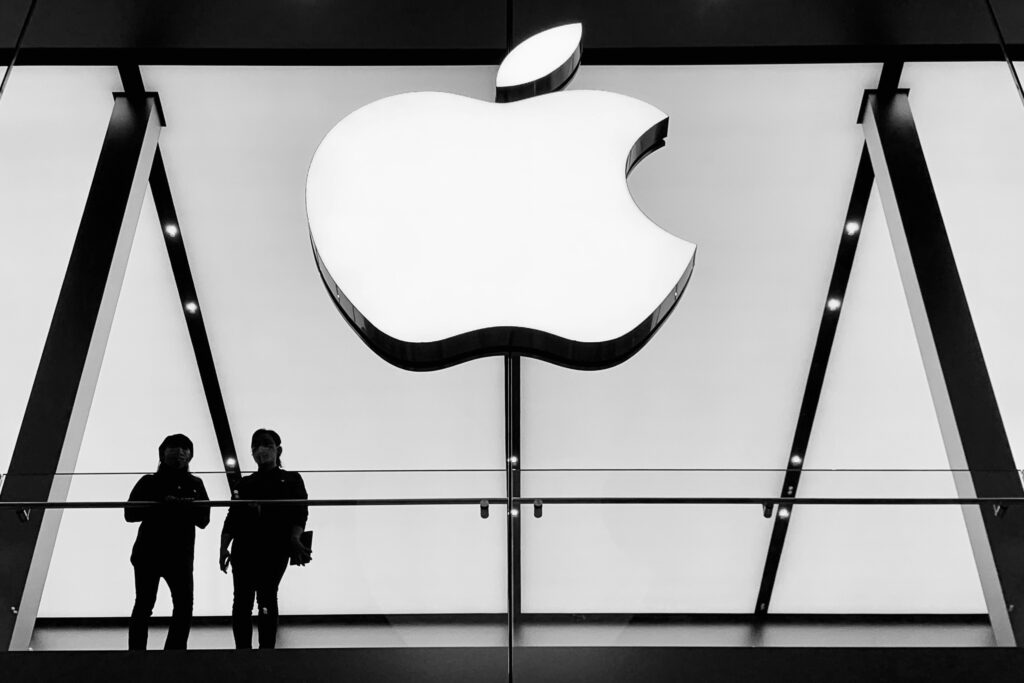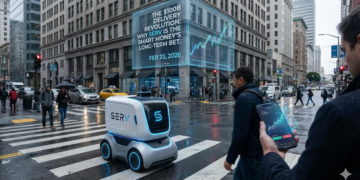Apple Inc. (NASDAQ:AAPL) is one of the most iconic and valuable companies in the world, widely recognized as a pioneer in personal technology and a global leader in innovation. Headquartered in Cupertino, California, Apple has become synonymous with cutting-edge design, user-centric functionality, and seamless ecosystem integration. From revolutionizing the personal computer industry to redefining the smartphone era, Apple has consistently set the benchmark for excellence in consumer electronics, software, and digital services.
Founded on April 1, 1976, by Steve Jobs, Steve Wozniak, and Ronald Wayne, Apple began its journey with the vision of making computers accessible and user-friendly. The company’s first major breakthrough was the Apple II, one of the first highly successful mass-produced personal computers. This success was followed by the introduction of the Macintosh in 1984, which popularized the graphical user interface and changed the trajectory of computing forever.
Despite facing significant challenges in the 1990s, Apple’s resurgence began when Steve Jobs returned to the company in 1997. What followed was an unprecedented era of innovation that reshaped multiple industries. In 2001, Apple launched the iPod, transforming digital music consumption. In 2007, the introduction of the iPhone disrupted the mobile phone market and laid the foundation for the modern smartphone era. The iPad, Apple Watch, AirPods, and Apple Vision Pro further extended the company’s dominance in hardware, while platforms like the App Store, iCloud, Apple Pay, Apple Music, and Apple TV+ turned Apple into a services juggernaut.
Today, Apple operates a vertically integrated business model that combines world-class hardware, intuitive software, and a growing suite of digital services. The company’s ecosystem includes over two billion active devices worldwide, reinforcing strong brand loyalty and recurring revenue streams. Apple’s proprietary chips—such as the M-series and A-series processors—enable unmatched performance, energy efficiency, and on-device AI capabilities, all of which fuel its next-generation experiences across iPhones, Macs, iPads, and wearables.
In recent years, Apple has also expanded its footprint into artificial intelligence, health tech, augmented reality, and fintech. Its privacy-first approach to AI, combined with cutting-edge custom silicon and the recently launched Apple Intelligence platform, positions the company at the forefront of the next computing revolution. Moreover, Apple continues to adapt to global regulatory environments, as seen in its recent overhaul of App Store policies in the European Union to comply with the Digital Markets Act.
Apple’s long-standing commitment to innovation, premium design, and customer privacy continues to drive its success in both mature and emerging markets. With a market capitalization exceeding $3 trillion, robust cash flow, and a relentless focus on the future, Apple Inc. remains not only a technology giant but also a cornerstone of global digital transformation.
Revamping Policies to Navigate the Regulatory Landscape
In July 2025, Apple made headlines once again—this time not for product innovation, but for its strategic response to increasing regulatory pressure in the European Union. The company has announced major revisions to its App Store policies in Europe, a direct move to comply with the Digital Markets Act (DMA) and avoid further fines from the European Commission. This comes after Apple was penalized in April with a €500 million fine for limiting developers’ ability to guide users toward cheaper subscription alternatives outside of the App Store.
To address this, Apple has revised its policies to allow developers greater freedom to redirect users to their own platforms. Developers who steer customers outside of the App Store will now face a reduced commission rate ranging from 5% to 15%, while those who continue to use Apple’s in-app purchase system will pay a 20% processing fee, with small developers eligible for even lower fees under the company’s Small Business Program.
This move is strategic and defensive, designed to avoid daily fines of up to €50 million, while also aligning Apple with the EU’s stricter digital regulations. Apple’s willingness to adapt showcases its regulatory agility—a critical factor as the company aims to sustain its footprint in international markets. The European Commission will continue to review these changes for compliance, but Apple’s preemptive steps could minimize financial and reputational damage while retaining substantial monetization through revised fee structures.

CHECK THIS OUT: POET Technologies (POET) Delivers 1.6T Optical Innovation—Is a Massive Revenue Surge Next? and BigBear.ai (BBAI) is Flying Under the Radar—But Not for Long. Here’s Why Bulls Are Piling In.
Apple Intelligence and the Shift to AI-First Computing
While Apple navigates regulatory terrain, it is also positioning itself at the forefront of the next great technology wave: artificial intelligence. At WWDC 2025, Apple introduced a sweeping update called Apple Intelligence, a collection of AI tools and features embedded deeply into iOS 18, macOS, and iPadOS. This includes real-time image generation, personalized Genmoji, smarter Siri capabilities, and visual search powered by large language models—all processed securely through on-device computing and private cloud execution.
This AI integration will not only make iPhones and Macs more functional—it will reshape user expectations across devices, further differentiating Apple from its hardware-focused competitors. The company’s approach to AI prioritizes privacy, low latency, and seamless user experience, ensuring that every interaction feels organic and secure. In a digital age increasingly concerned with data misuse, Apple’s emphasis on AI with privacy at the core may become a defining advantage.
Furthermore, Apple is reportedly in talks to acquire Perplexity AI, a rapidly rising AI search engine startup valued at $14 billion. If completed, the acquisition would turbocharge Apple’s entry into generative search, significantly improve Siri’s capabilities, and help the company compete directly with Google’s AI-powered search dominance. Bank of America recently reaffirmed its Buy rating on AAPL and maintained a $235 price target, citing the strategic value of such a deal.
iPhone 16, A18 Chips, and Silicon Dominance
Apple’s leadership in custom silicon is another foundational strength. With the launch of the iPhone 16 lineup and its next-gen A18 and A18 Pro chips, Apple continues to push the boundaries of mobile performance. These chips deliver a massive leap in AI processing and energy efficiency, enabling enhanced real-time machine learning tasks like voice synthesis, image classification, and augmented reality.
Apple’s vertically integrated chip design not only gives it better control over hardware optimization, it also fuels its AI ambitions by enabling edge computing at scale. This makes devices faster, more responsive, and more capable of handling large language model tasks without needing to rely entirely on cloud infrastructure.
Expanding Global Reach and Services Monetization
Apple’s shift toward subscription-based revenue is perhaps its most underappreciated growth engine. In 2025, services like Apple Music, iCloud+, Apple TV+, Fitness+, and Apple Pay collectively generate over $85 billion in annual revenue. This division enjoys gross margins well above hardware, helping insulate the company’s bottom line even in years of softer iPhone upgrades.
Additionally, Apple is expanding its international footprint, introducing region-specific products and pricing models. For instance, the recently released iPhone 16e, priced at $599, was specifically designed to appeal to budget-conscious consumers in emerging markets. By growing its global user base and driving service subscriptions, Apple is laying the groundwork for recurring revenue growth, which could become increasingly important in a high-interest rate environment.
Resilience Amidst Headwinds and Re-Rating Potential
Although Apple shares have underperformed the broader tech sector year-to-date, falling behind names like Nvidia, Amazon, and Microsoft, analysts are increasingly viewing this as a buy-the-dip opportunity. Many of Apple’s headwinds—ranging from softer iPhone cycles to EU regulatory pressure—are now largely priced in. On the other hand, the upside potential from AI, custom silicon, Perplexity AI integration, and international services growth remains significant and underappreciated.
The recent App Store policy changes also demonstrate Apple’s capacity to adapt and preserve its monetization model, even under regulatory scrutiny. This resilience reinforces the bullish case that Apple remains a fundamentally strong, cash-generating business with multiple levers for future growth.
Final Word: Apple Is Quietly Building the Future of Personal Technology
Apple Inc. may be navigating a complex landscape of global regulation and intensifying competition in AI, but its trajectory remains undeniably upward. From regulatory adaptability to AI innovation, from chip engineering to services growth, Apple is not just defending its $3 trillion empire—it’s reinventing it for a new digital age.
Investors looking for a blue-chip stock with innovation depth, strong cash flow, and AI-driven optionality should continue to view AAPL as a core long-term holding. As the company embraces a future centered around intelligence, privacy, and global reach, Apple remains one of the most investable—and durable—companies in the market.
READ ALSO: MicroVision (MVIS): A Top Pick in Autonomous Tech Stocks and Innoviz (INVZ) May Be Severely Undervalued — Investors Shouldn’t Ignore This Stock.






